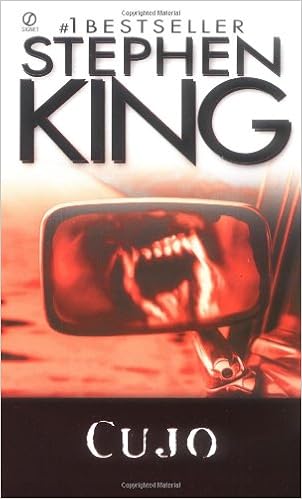I love horror flicks. I read almost every Stephen King book as soon as it is released. And I still sleep well at night. Why? Because I know there is no Jason who will rise from Crystal Lake and kill me if I have pre-marital sex (as seems to be every victim’s sin in Friday the 13th movies). And I don’t believe bullied students can seek revenge with telekinetic powers (Carrie), homicidal clowns live in the neighborhood sewer (It) or having been the site of a vicious murder results in a hotel being haunted for all time (The Shining).
 There are only two King novels which actually gave me the willies. I have been bitten by a dog (as in Cujo) and experienced the anxiety of not knowing whether I would need a painful regimen of rabies shots. And there are too many instances of mentally unstable fans, like Annie Wilkes in Misery, who stalk celebrities (John David Chapman/John Lennon or Yolanda Saldivar/Selena) or crave attention and commit violent acts (John Hinckley, Jr./Ronald Reagan).
There are only two King novels which actually gave me the willies. I have been bitten by a dog (as in Cujo) and experienced the anxiety of not knowing whether I would need a painful regimen of rabies shots. And there are too many instances of mentally unstable fans, like Annie Wilkes in Misery, who stalk celebrities (John David Chapman/John Lennon or Yolanda Saldivar/Selena) or crave attention and commit violent acts (John Hinckley, Jr./Ronald Reagan).
If I were to give this syndrome a name, it would be “anxiety déjà vu (ADV).” It emerges when one’s fear index rises having witnessed something they have seen or experienced before. Fortunately, occasions on which I suffer bouts of ADV are very rare and very infrequent. This morning was again one of those instances.
Several news outlets, reporting on a Trump rally of Iowa evangelicals in Council Bluffs, quoted the Republican presidential candidate as saying.
Raise your hands, Christian Conservatives…everybody. Raise your hand if you’re not a Christian conservative—I want to see this, right. That’s—oh, there’s a couple people, that’s all right. I think we’ll keep them, right? Should we keep them in the room, yes? I think so. (Source: Time.com, September 28, 2016)
Huffington Post reported Trump “appeared to be joking.” And that very well may be the case. But even an attempt at humor triggered my ADV. How can a candidate for President of the United States not appreciate asking people to identify themselves according to their faith has historical precedence? Whether those asking were Roman, German or the Islamic State, the outcome has always been the same.
 Do I believe Donald Trump is the next Hitler? No. But history tells us he doesn’t have to be. Kristallnacht (Chrystal Night also known as the Night of Broken Glass), the most infamous pogrom (violent riot) against German Jews was not conducted by the military under Hitler’s command. The November 1938 event was carried out by German citizens and the Sturmabteilung (the paramilitary arm of the Nazi party). All the German government had to do was look the other way.
Do I believe Donald Trump is the next Hitler? No. But history tells us he doesn’t have to be. Kristallnacht (Chrystal Night also known as the Night of Broken Glass), the most infamous pogrom (violent riot) against German Jews was not conducted by the military under Hitler’s command. The November 1938 event was carried out by German citizens and the Sturmabteilung (the paramilitary arm of the Nazi party). All the German government had to do was look the other way.
And that is what REALLY scares me.
For what it’s worth.
Dr. ESP
 On the September 18 edition of CNN’s Reliable Sources, a panel of media “experts” including Carl Bernstein complained Trump officials had advertised the event as a “press conference.” Instead, after Trump’s 37 second terse and inaccurate assessment of his role in the birther conspiracy, he left the stage without any opportunity for attending reporters to question him. As part of the discussion, the show’s host Brian Stelter had the following exchange with CNN political reporter Jeremy Diamond.
On the September 18 edition of CNN’s Reliable Sources, a panel of media “experts” including Carl Bernstein complained Trump officials had advertised the event as a “press conference.” Instead, after Trump’s 37 second terse and inaccurate assessment of his role in the birther conspiracy, he left the stage without any opportunity for attending reporters to question him. As part of the discussion, the show’s host Brian Stelter had the following exchange with CNN political reporter Jeremy Diamond. Many of you will remember the picture on the right of NBC News political director Tim Russert and his now-famous, low-tech white board. Early in the evening, Russert predicted the 2000 election would hinge on the outcome in Florida. And after weeks of recounts and legal challenges, everyone was congratulating Russert for his foresight.
Many of you will remember the picture on the right of NBC News political director Tim Russert and his now-famous, low-tech white board. Early in the evening, Russert predicted the 2000 election would hinge on the outcome in Florida. And after weeks of recounts and legal challenges, everyone was congratulating Russert for his foresight.